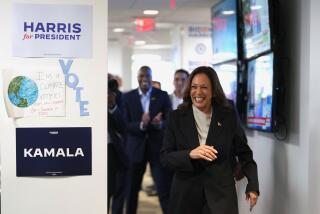Bush Wins GOP Primary in Delaware
- Share via
George W. Bush strode to victory Tuesday in the Delaware primary, rebounding from his New Hampshire defeat. But the bigger surprise was John McCain, who ignored the state but still surged past Steve Forbes to finish second.
The outcome is likely to increase pressure on Forbes to quit the GOP contest ahead of the next showdown, Feb. 19 in South Carolina.
And it certified Sen. McCain of Arizona as a genuine political phenomenon, still gathering steam from his landslide victory over Texas Gov. Bush a week earlier. Interviews with voters showed that nearly half of McCain’s supporters decided to vote for him in the days since New Hampshire, a burst of momentum reflected in polls across the country.
Bush finished with 51% to McCain’s 25%, capturing all 12 of Delaware’s delegates to the GOP’s national nominating convention. Forbes, who campaigned longer and harder in Delaware than anyone else, finished with 20% and former deputy U.N. ambassador Alan Keyes had 4%.
The Delaware primary was a sidelight to the main campaign events in New Hampshire and South Carolina. Still, both Bush and Forbes had significant stakes riding on the outcome in the tiny thumbprint of a state.
For Bush, the win, while hardly overwhelming, was a chance to crow of a comeback from his New Hampshire debacle, and he wasted no time seizing on the results.
“I’m pleased with the vote,” Bush said after giving a dinner speech to home builders in Columbia, S.C. “I want to thank the people of Delaware for their vote of confidence. I think it’s going to be helpful.”
Asked by reporters if 51% was enough to claim a clear-cut victory, Bush replied: “I won every delegate and we’re in the delegate business.”
But McCain also found something to brag about. He never set foot in Delaware and didn’t spend a nickel on advertising. “I’m extremely surprised and pleased that we’d get that kind of vote in a state we never visited,” he said at a reception in Charleston, S.C. “It’s bound to give us a boost when you haven’t even visited the state.”
For Forbes, the results were particularly disheartening. “We’re clearly disappointed,” said Bill Dal Col, manager of Forbes’ campaign. “We would have liked to have done better.”
Delaware was the place Forbes hoped to gain a foothold for a campaign increasingly inching toward irrelevancy. Instead, his poor showing seemed certain to build pressure on Forbes to exit the race.
“Being defeated by an absentee candidate moves into the realm of humiliation,” said Nelson Warfield, a GOP strategist who is neutral in the party’s contest. “The people who he respects as true conservatives, people like the editors of the National Review and William F. Buckley, have already told Steve it’s time to hang up the gloves. I think he’ll start hearing that even more.”
For now, however, Forbes insisted he was in the race to stay. “We’re now moving on to South Carolina and Michigan” on Feb. 22, Dal Col said, speaking for the publisher. “We’ll assess things further as we move through those states. Michigan will clearly be of more emphasis for us and we will make decisions based on how things go.”
Delaware wedged itself into the early campaign calendar in an effort to steal some attention from New Hampshire’s first-in-the-nation primary. But the move largely failed when most candidates, Democratic and Republican, opted to ignore the state rather than offend New Hampshire sensibilities.
The exception was Forbes, who won Delaware four years ago after front-runner Bob Dole skipped the state in deference to New Hampshire. But Forbes was joined in the last week by Bush, who stepped up his efforts after his 18-point loss to McCain in New Hampshire.
Bush sought to turn his redoubled attention to his advantage, repeatedly contrasting his efforts in Delaware with McCain’s snub of the state. “I don’t think candidates should be picking and choosing,” Bush said while stumping Tuesday at a retirement community in Wilmington.
“This a long process,” he said. “‘There’s a nominating process in all 50 states and I take all 50 seriously.”
In Delaware, like most of the rest of the country, Bush ran with the strong backing of the state political and business establishments. Unlike New Hampshire, where independents were free to participate, strongly backing McCain, the voting in the GOP primary was limited to registered Republicans.
Exit surveys conducted by Voter News Service, a consortium of Associated Press and major television networks, found Bush did best among Delaware Republicans who were middle-class, elderly, conservative and those who thought moral values were the top issue. Six in 10 voters said Bush would be most likely to beat the Democratic nominee, and nearly three-quarters of them voted for the Texas governor.
McCain did best among voters who were more affluent, better educated, more independent-minded, favored abortion rights and those who want a candidate who stands up for what he believes. Nearly half of the voters said McCain’s military record was important to them. McCain, who spent 5 1/2 years as a POW in Hanoi, won 60% of those who said his military experience was very important and a third of those who said it was somewhat important.
Delaware Republicans had Tuesday to themselves. The Democrats held their primary Saturday, with Vice President Al Gore beating former New Jersey Sen. Bill Bradley, 57% to 40%, in a nonbinding popularity contest. Delaware will select its 22 delegates to the Democratic nominating convention in March.
Times staff writers Doyle McManus, Anne-Marie O’Connor and Eric Slater contributed to this story.
More to Read
Get the L.A. Times Politics newsletter
Deeply reported insights into legislation, politics and policy from Sacramento, Washington and beyond. In your inbox three times per week.
You may occasionally receive promotional content from the Los Angeles Times.











